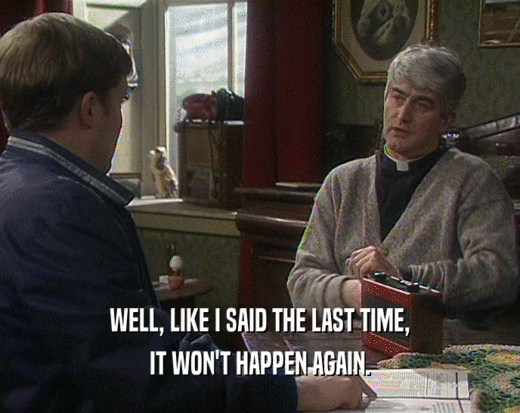Toward the beginning of Jesus’s famous “Sermon on the Mount,” sits one of the most challenging verses in all of scripture for me. It’s not the parts about turning the other cheek or not worrying. It’s when He’s talking about anger, but not even the part when He was talking about being angry. It’s when He brings up what to do if someone has something against me:
“So if you are presenting a sacrifice at the altar in the Temple and you suddenly remember that someone has something against you, leave your sacrifice there at the altar. Go and be reconciled to that person. Then come and offer your sacrifice to God.” – Matthew 5:23-24
At face value, it seems like Jesus was telling us that we shouldn’t try to practice our faith and church gatherings when we have someone that has been wronged by us in any way. And that seems to be fairly accurate.

So, if that’s the case, then I need to be absolutely sure that I am doing my best to apologize to anyone I’ve hurt, wronged, misunderstood, or upset. And, as I’ve been teaching my 4-year-old daughter, it’s a lot more than just saying saying, “I’m sorry.”
Every good apology has at least three parts. And if you master them, people will start pretending you upset them just hear your expert, eloquent, effective, and expressive apologies.
1. Re-tell what happened.
The first aspect of any saintly apology is to accurately explain what I did, why I did it, and how it affected the other person. This is much more than simply stating something like, “I’m sorry I hurt your feelings.”

A great apology has to make the injured person confident that you understand how you hurt them and why it hurt.
So, if I hurt my wife’s feelings by answering a question sarcastically or with a bit more attitude than I should have, my apology needs to include not only my actions, but how those actions made her feel: “I’m sorry I was sarcastic with your question. I know that makes you feel disrespected and that I think you’re too stupid to figure it out yourself. I’m sorry I made you feel that way. It was not my intention, but I should have been more patient and I was wrong.”
Notice some key phrases there: “that makes you feel,” “I made you feel,” “I was wrong.” If my apology does not include those things, then I haven’t really acknowledged the pain I caused and my responsibility for having caused it.
A great apology will always include:
- Listing my actions
- Listing the pain it caused
- Accepting full responsibility for my actions
- NO EXCUSES or explaining away
2. Repair the damage done.
This is the step I most often miss, but I am beginning to think it’s one of the most important parts of a full apology. There are times when this principle is simple to understand and accomplish, like when my son breaks one of his sister’s dolls. After re-telling what happened and acknowledging his responsibility and how it hurt his sister, he must then make it up to her.
Sometimes it’s by giving her one of his toys. Other times is by saving up his own money to replace the toy he broke. The point is that his words of apology are not enough. Apologies should be costly, just like the original actions were.
A great example of this principle is in Luke 19. Jesus encountered a man named Zacchaeus who had been stealing from his community for years. Something about Jesus caused Zacchaeus to realize how evil his actions had been, and instead of simply saying he wouldn’t steal anymore, he said:
“I will give half my wealth to the poor, Lord, and if I have cheated people on their taxes, I will give them back four times as much!” – Luke 19:8
Talk about reparations!

Repairing the damage I’ve done when it was mainly my short fuse and hurt feelings is less clear cut, but it’s no less important. Sometimes, it’s as simple as asking, “How can I make it up to you?”
When I ask that question, I am displaying my willingness wot also do something costly that’s in proportion to the pain I caused.
Usually, that’s where it can end, but sometimes it’s finishing the prep for dinner, or playing alone with my son for 15 minutes. The point is to always be willing to lose some fo your convenience, priorities, or possessions in your saint-like apology.
3. Request Reconciliation and Forgiveness
Then, once I listed my failures, the ways I hurt the other person, and figure out a way to make it up to them, I ask for forgiveness and reconciliation. It is vital to remember here that they do not owe me forgiveness.
Before I can expect them to even think about reconciliation or forgiveness, I need to outline the ways I hope to avoid making the same mistake again in the future. True repentance has two parts: first is admitting what you did wrong, second is changing your behavior to avoid doing it again.

My wife and I have decided that the first 10 minutes of us both being home from work is for catching up and reconnecting. It’s not for talking about plans, needs, or expectations. It’s just for talking about our day, mood, and anything else that is important. That small change has significantly cut down on the number of times we are short with each other and hurt feelings.
A small habit change we started after one apology has led to us needing many fewer apologies at all.
Nearly every time I wrong someone there are choices I made leading up to that incident that I could have avoided. By examining my behaviors and motivations leading up to my failure, I can usually see fairly quickly how to avoid making that mistake again.
Whether they offer forgiveness or not, you can feel confident that you’ve done everything you can to amend and atone for the pain and suffering. Then you can return the altar and resume your worship.
If you have someone you can think of that you have harmed or that has harmed you, but there has yet to be a genuine and full apology or the offer of forgiveness, then we have a series just for you!
Forgiveness – whether we embrace it or reject it – has a huge impact on our lives. This 15 day series dives into stories from your favorite Christian artists and personalities who have been there. They’ll share how God’s Word has challenged their perspective and transformed their lives through the power of this one word.
[caldera_form_modal id=”CF5bad115656505″ type=”button”]I Want to Learn More About Forgiveness[/caldera_form_modal]

Recent Comments